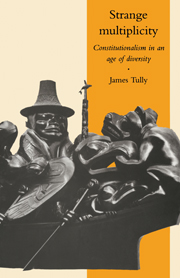Book contents
- Frontmatter
- Contents
- Preface
- Acknowledgements
- Illustration: ‘The spirit of Haida Gwaii’
- 1 Demands for constitutional recognition
- 2 Diversity and contemporary constitutionalism
- 3 The historical formation of modern constitutionalism: the empire of uniformity
- 4 The historical formation of common constitutionalism: the rediscovery of cultural diversity, part 1
- 5 The historical formation of common constitutionalism: the rediscovery of cultural diversity, part II
- 6 Constitutionalism in an age of cultural diversity
- Notes
- Guide to further reading
- Bibliography
- Index
2 - Diversity and contemporary constitutionalism
Published online by Cambridge University Press: 05 June 2012
- Frontmatter
- Contents
- Preface
- Acknowledgements
- Illustration: ‘The spirit of Haida Gwaii’
- 1 Demands for constitutional recognition
- 2 Diversity and contemporary constitutionalism
- 3 The historical formation of modern constitutionalism: the empire of uniformity
- 4 The historical formation of common constitutionalism: the rediscovery of cultural diversity, part 1
- 5 The historical formation of common constitutionalism: the rediscovery of cultural diversity, part II
- 6 Constitutionalism in an age of cultural diversity
- Notes
- Guide to further reading
- Bibliography
- Index
Summary
Answering the constitutional question: an outline
The first chapter laid out the difficult issues raised by the question of the constitutional recognition of cultural diversity in a post-imperial age. In the following chapters I propose an answer to the question. A contemporary constitution can recognise cultural diversity if it is reconceived as what might be called a ‘form of accommodation’ of cultural diversity. A constitution should be seen as a form of activity, an intercultural dialogue in which the culturally diverse sovereign citizens of contemporary societies negotiate agreements on their forms of association over time in accordance with the three conventions of mutual recognition, consent and cultural continuity.
To see the justice of this simple and somewhat obvious answer, however, it is necessary to question and amend a number of assumptions of contemporary constitutionalism. I carry out this task of critical reflection in the following steps. In this chapter I lay out the main conventions of the language of contemporary constitutionalism and discuss the ways in which contemporary legal and political theorists have employed them to respond to the politics of cultural recognition. Just as Bill Reid turned to Haida artistic traditions to do justice to the spirit of Haida Gwaii, I then turn to the traditions of constitutionalism over the last four centuries to do justice to the demands of cultural recognition.
- Type
- Chapter
- Information
- Strange MultiplicityConstitutionalism in an Age of Diversity, pp. 30 - 57Publisher: Cambridge University PressPrint publication year: 1995



